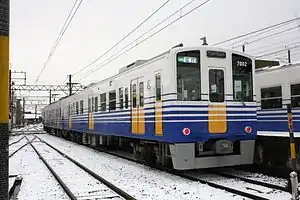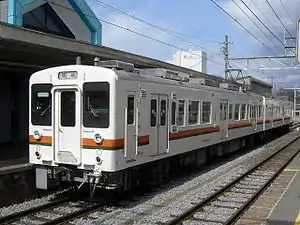Echizen Railway 7000 series
The 7000 series (7000形) is a DC electric multiple unit (EMU) train type operated in Japan by the third sector railway operator Echizen Railway since February 2013. Converted from former 119 series EMUs operated by JR Central until 2012, a total of six 2-car sets are scheduled to be introduced between fiscal 2012 and 2013, replacing the older 1101 series, 2101 series, and 2201 series trains.[1]
| 7000 series | |
|---|---|
 The first set in service, February 2013 | |
| In service | February 2013 – |
| Constructed | 1982–1983 |
| Number under construction | 6 vehicles (3 sets) |
| Number built | 6 vehicles (3 sets) |
| Number in service | 6 vehicles (3 sets) |
| Formation | 2 cars per trainset |
| Operator(s) | Echizen Railway |
| Specifications | |
| Car body construction | Steel |
| Car length | 20,000 mm (65 ft 7 in) |
| Width | 2,832 mm (9 ft 3.5 in) |
| Height | 3,935 mm (12 ft 10.9 in) |
| Doors | 3 pairs per side |
| Traction system | Variable frequency |
| Electric system(s) | 600 V DC |
| Current collection method | Overhead catenary |
| Track gauge | 1,067 mm (3 ft 6 in) |
Design
The 7000 series trains were converted from former 119 series 2-car EMUs operated by JR Central on the Iida Line until they were withdrawn from service in March 2012. Modifications included the following changes:[1]
- Removal of front-end gangway connections
- Addition of new headlights above the cab-end centre doors
- Addition of front-end skirts
- Addition of single-arm pantographs
- Removal of toilets
- Repainting into the standard Echizen Railway livery
Formations
As of 1 April 2013, three two-car sets are in service, formed as follows, with one motored driving (Mc) car and one non-powered driving trailer (Tc) car.[2]
| Designation | Mc | Tc |
|---|---|---|
| Numbering | MoHa 7000 | KuHa 7000 |
The MoHa 7000 cars are fitted with two single-arm pantographs.[2]
Interior
Passenger accommodation retains the original mixture of longitudinal bench seating and transverse 4-seat bays used in the 119 series.[1] The toilet originally fitted to the KuHa car has been removed.[1]
History
The first set, 7001 + 7002 entered service on 4 February 2013, the second set, 7003 + 7004, entered service on 3 March 2013, and the third set, 7005 + 7006, entered service on 18 March 2013.[3] Three more two-car sets are scheduled to be introduced during fiscal 2013.[3]
Build details

| Set No. | Car No. | Original JR number | Entry into service |
|---|---|---|---|
| 1 | MoHa 7001 | KuMoHa 119-5318 | 4 February 2013 |
| KuHa 7002 | KuHa 118-5311 | ||
| 2 | MoHa 7003 | KuMoHa 119-5330 | 3 March 2013 |
| KuHa 7004 | KuHa 118-5322 | ||
| 3 | MoHa 7005 | 18 March 2013 | |
| KuHa 7006 | |||
| 4 | MoHa 7007 | ||
| KuHa 7008 | |||
| 5 | MoHa 7009 | ||
| KuHa 7010 | |||
| 6 | MoHa 7011 | ||
| KuHa 7012 |
References
| Wikimedia Commons has media related to Echizen Railway 7000 series. |
- "えちぜん鉄道7000形" [Echizen Railway 7000 series]. Japan Railfan Magazine (in Japanese). Vol. 53 no. 625. Japan: Koyusha Co., Ltd. May 2013. pp. 58–59.
- 私鉄車両編成表 2013 [Private Railway Rolling Stock Formations - 2013]. Japan: JRR. 30 July 2013. p. 119. ISBN 978-4-330-39313-1.
- "私鉄・三セクの国鉄形" [Former JNR trains used by private & 3rd sector railways]. Japan Railfan Magazine (in Japanese). Vol. 54 no. 634. Japan: Koyusha Co., Ltd. February 2014. pp. 42–43.